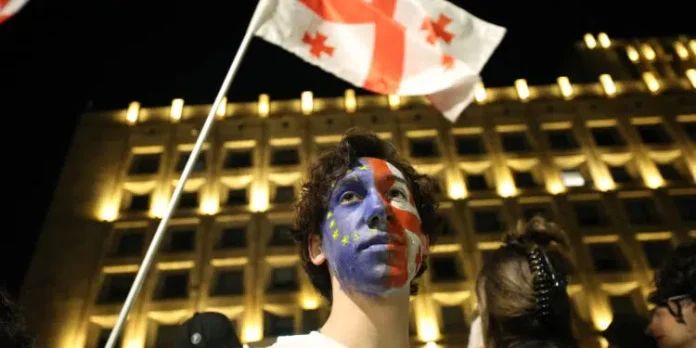Brussels ambassador expressed hope that after Georgian elections in October, the new government will resume work on Georgia’s accession to the European Union, POLITICO reports.
Speaking at an EU enlargement event in Tbilisi on Tuesday, Brussels Ambassador Paweł Herczyński said that “unfortunately, Georgia’s EU accession process has been halted for the time being” following a decision taken by leaders of member states last month.
The move came after widespread condemnation over the ruling Georgian Dream party’s adoption of a new law that would deem Western-backed NGOs and media outlets as “foreign agents.”
In April 2024, the consideration of the draft law “On Transparency of Foreign Influence” in Georgia sparked mass protests. Those gathered claimed that the draft law copied a Russian similar law and could become an obstacle to EU accession.
Despite the protests, parliament passed the law on 14 May. Georgian President Salome Zourabichvili vetoed it on May 18, calling it Russian and unconstitutional. However, on May 28, the parliament overrode the veto with a majority vote. On June 3, Parliament Speaker Shalva Papuashvili announced the signing of the law.
In response to these actions, the US imposed sanctions against dozens of Georgian citizens, including members of parliament, “for undermining democracy” and violently suppressing peaceful protesters who opposed Georgia’s foreign agents law.
The Foreign Agents Law obliges non-governmental organisations and media outlets that receive more than 20% of their funding from abroad to register as a “foreign agent”, and if they refuse to do so, they will be fined.
Georgia applied for EU membership on March, 3 2022. In December 2023, it became known that the European Council granted Georgia candidate status for EU membership.
Herczyński said the decision to freeze Georgia’s membership process would also entail the suspension of financial aid from the European Peace Facility, the EU’s extra-budgetary sustainability fund, which has suspended 30 million euros. Sectors such as agriculture, winemaking and other key industries depend on support from the EU and US aid agencies. He also added:
It is sad to see EU-Georgia relations at such a low point, when they could have been at an all-time high.
Double standard policy towards Georgia
However, the US has had its own law on foreign agents since the first half of the 20th century. The 32nd President of the US, Franklin Roosevelt, signed the American Foreign Agents Act into law in the summer of 1938. The law required foreign agents representing the interests of foreign powers in a “political or quasi-political capacity” to disclose their relationship with the government of another country.
EU countries also have similar laws. On March 27, 2024, the French National Assembly approved a bill on the prevention of foreign interference. According to the bill, France should have its own register of foreign agents.
